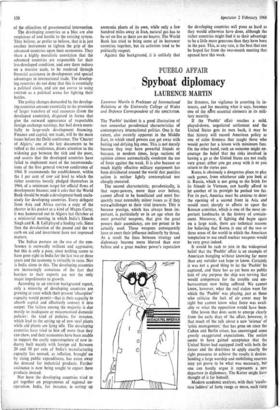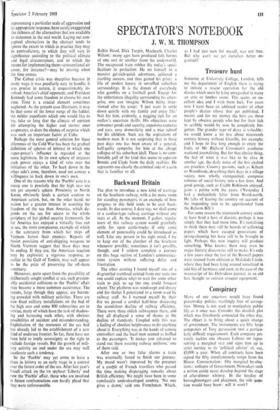Spyboat diplomacy
PUEBLO AFFAIR LAURENCE MARTIN
Laurence Martin is Professor of International Relations at the University College of Wales and Defence Correspondent of the SPECTATOR.
The 'Pueblo' incident is a good illustration of two somewhat paradoxical characteristics of contemporary international politics. One is the extent, also recently apparent in the Middle East, to which small powers can get away with baiting and defying big ones. This is not merely because they may have powerful friends or because, in modern times, large sections of opinion almost automatically condemn the use of force against the weak. It is also because so much highly effective military equipment has been distributed around the world that punitive action is neither lightly contemplated nor cheaply executed.
The second characteristic, paradoxically, is that super-powers, more than ever before, cannot afford to be humiliated and must fre- quently treat ostensibly minor issues as if they were 'challenges to their vital interests. This is because prestige, which has always been im- portant, is particularly so in an age when the most powerful weapons, that give the great powers their ascendancy, are too potent to be actually used. These weapons consequently have to exert their influence indirectly by threat. As a result the lines between strategy and diplomacy become more blurred than ever before and a great nuclear power's reputation for firmness, for vigilance in asserting its in- terests, and for meaning what it says, becomes one of the nibst essential elements in its mili- tary security.
If the `Pueblo' affair reaches a mild, played-down, negotiated settlement and the United States gets its men back, it may be that history will record American policy as one of calm firmness that taught those who would pester her a lesson with minimum fuss. On the other hand, such an outcome might en- courage the belief that the risks involved in having a go at the United States are not really very great; either you get away with it or you return to the status quo.
Korea is obviously a dangerous place to play such games, from whichever side you look at it. Russia, which is not going to the brink for its friends in Vietnam, can hardly afford to let- another of its prot6ges be pushed too far. For its part, America must be anxious to deter the opening of a second front in Asia and would react sharply to efforts to upset the Korean armistice, which is one of the most im- portant landmarks in the history of contain- ment. Moreover, if fighting did begin dgain on a large scale, there are technical reasons for believing that Korea is one of the two or three areas of the world in which the American temptation to use small nuclear weapons would be very great indeed.
It would be rash to join in the widespread belief that the 'Pueblo' affair is an example of American bungling without knowing far more than any outsider can hope to know. Certainly it was not a good thing to let the `Pueblo' be captured, and there has as yet been no public hint of any purpose the ship was serving that would compensate for the trouble and em- barrassment now being suffered. We cannot know, however, what the real stakes were for which the 'Pueblo' was playing, just as those who criticise the lack of air cover may be right but cannot know what force was avail- able or what the opposition would have been.
One lesson that does seem to emerge clearly from the early days of the affair, however, is that much of the talk about a new 'science' of `crisis management,' that has gone on since the Cuban and Berlin crises, has encouraged some grossly exaggerated expectations. The notion seems to have gained acceptance that the United States had equipped itself with both the forces and the doctrines to apply exactly the right pressures to achieve the results it desires. Sending a large warship and mobilising reserves may yet prove to be what was necessary, but one can hardly argue it represents a new departure in diplomacy. The Kaiser might have thought of it for himself.
Modern academic analysts, with their `escala- tion ladders' of forty rungs or more, each rung
representing a particular scale of aggression and its appropriate response, have surely exaggerated the richness of the alternatives that are available to statesmen in the real world. Laying out con- ceptual alternatives in the abstract tends to ignore the extent to which in practice they may be contradictory, to which they will vary in significance according to the political climate and legal circumstances, and to which the means for implementing them—conventional air cover, for instance?—may be missing when the time comes.
The Cuban crisis was deceptive because in many ways it was peculiarly easy to handle; it was precise in nature, it unquestionably in- volved America's chief opponent, and President Kennedy had some freedom to choose his own time. Time is a crucial element sometimes neglected. As the present case illustrates, it may be that some of the lower rungs of the ladder, the milder expedients which one would like to try, take so long that the climate of opinion for attempting the higher and sterner ones evaporates, as does the chance of surprise which was such an important factor at Cuba.
Perhaps the most general solution for these dilemmas of the Cold War has been the gradual definition of spheres of interest in which one super-power's influence is regarded as the more legitimate. In its own sphere of interests each power enjoys a kind of veto over the initiatives of the other. To back down in the other side's zone, therefore, need not convey a willingness to back down in one's own.
One of the reasons why the 'Pueblo' case is a messy one is precisely that the high seas are not yet anyone's sphere. Proximity to North Korea obviously lends a certain caution to American action, but, on the other hand, no nation has a greater interest in asserting the freedom of the sea than America, which de- pends on the sea for access to the whole periphery of her global security framework. So far America has enjoyed a virtually free run at sea, the most conspicuous example of which is the sanctuary from which her ships off Vietnam harass their enemies. Reports of Soviet provision of anti-shipping weapons to North Vietnam suggest that these days may be ending. If they are, the American reaction may be explosive; a vigorous response, as earlier in the Gulf of Tonkin, may well appear to be the price of preserving the off-shore sanctuary.
Moreover, .quite apart from the possibility of deliberately sought conflict at sea, such presum- ably accidental collisions as the 'Pueblo' affair may become a more common occurrence. The oceans, large though they appear, are becom- ing crowded with military activities. There are now fixed military installations on the bed of the high seas and some 800 submarines are in service, many of which have the task of shadow- ing and harassing each other, with obvious possibilities of accident and misunderstanding. Exploitation of the resources of the sea bed has already led to the establishment of a new kind of undersea frontier. So far, these have not been held to imply sovereignty or the right to exclude foreign vessels. But the growth of mili- tary activity on and under the sea may well accelerate such a tendency.
So the 'Pueblo' may yet come to have a place in history as an early stage in a contest' over the future order of the sea. After last year's Israeli attack on the us spyboat 'Liberty' and now the 'Pueblo' affair, those who are involved in future confrontations can hardly plead that they were unforeseeable.



































 Previous page
Previous page